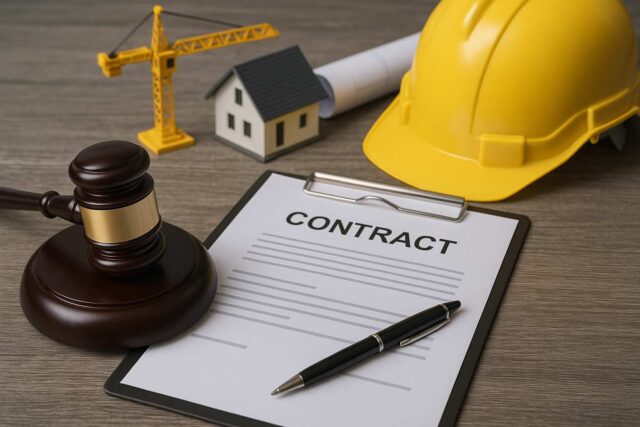
Landlord-tenant relationships are governed by a combination of lease agreements and state laws. In New Jersey, these relationships can become complicated quickly when disputes arise, especially when they involve issues like property damage, eviction, security deposits, or personal injury. Whether you are a landlord managing rental properties or a tenant trying to protect your rights, understanding your legal options is crucial. The attorneys at Gruber, Colabella, Thompson, Hiben & Montella have years of experience representing both landlords and tenants across Sussex County. Contact our landlord-tenant lawyers for assistance today.
Common Types of Landlord-Tenant Disputes in New Jersey
Disputes between landlords and tenants can arise from many different circumstances. These disagreements often involve violations of lease agreements, but they may also stem from statutory obligations under New Jersey law. The most common legal conflicts include nonpayment of rent, breach of lease, unsafe or uninhabitable living conditions, wrongful eviction, and failure to return security deposits.
- Eviction Proceedings (Summary Dispossess Actions): In New Jersey, landlords must follow a specific legal process before removing a tenant from a property. Most residential evictions require a court order. Landlords cannot change locks, shut off utilities, or otherwise force a tenant to leave without legal authorization. Grounds for eviction include nonpayment of rent, disorderly conduct, or chronic late payments. However, even in clear-cut cases, landlords must adhere to strict notice requirements, such as serving a Notice to Cease or a Notice to Quit depending on the situation.
- Security Deposit Disputes: State law limits the amount a landlord can collect for a security deposit (no more than one and a half times the monthly rent) and dictates how quickly it must be returned after a tenancy ends. If a landlord fails to return the deposit within 30 days or does not provide an itemized list of damages, they may be liable for damages, including double the amount wrongfully withheld.
- Habitability and Maintenance Claims: New Jersey’s “implied warranty of habitability” requires that landlords provide safe, sanitary, and livable rental units. If a property has dangerous conditions such as mold, pest infestations, broken heating systems, or structural defects, tenants may have the right to withhold rent, make repairs and deduct the cost, or even pursue damages. Habitability disputes can also lead to tort claims, particularly when personal injury results from the landlord’s failure to maintain the property.
- Tort-Based Claims: Not all landlord-tenant disputes revolve around contract law. Sometimes, civil wrongs or torts occur, such as negligence or intentional infliction of emotional distress. For example, if a tenant is injured due to a broken staircase the landlord failed to fix despite repeated complaints, the tenant may file a personal injury claim under premises liability law. Conversely, landlords may pursue tort claims against tenants for property damage caused by recklessness or intentional acts.
Legal Protections and Responsibilities for Landlords and Tenants
Both landlords and tenants in New Jersey have specific rights and duties established by state law, many of which are outlined in the New Jersey Anti-Eviction Act, Landlord Registration Act, and Truth-in-Renting Act. Knowing these laws helps both parties avoid unintentional violations that can lead to costly litigation.
Some of the most important and routine landlord duties include:
- Registering the rental property with the state.
- Providing habitable and safe living conditions.
- Giving proper notice before entering the rental unit.
- Following correct procedures for raising rent or terminating a tenancy.
Some important tenant responsibilities generally are:
- Paying rent on time and in full.
- Maintaining cleanliness and avoiding property damage.
- Notifying the landlord of needed repairs in a timely manner.
- Respecting the rights of neighbors and the community.
In addition, landlords must comply with anti-discrimination laws under the New Jersey Law Against Discrimination (NJLAD) and the Fair Housing Act. Refusing to rent to someone based on race, religion, national origin, disability, family status, or sexual orientation is prohibited and could result in serious legal consequences.
When to Seek Legal Representation in Landlord-Tenant Matters
What seems like a simple dispute can quickly escalate into litigation with significant financial consequences. As such, landlords may benefit from legal counsel in a variety of situations, such as:
- Drafting legally sound lease agreements.
- Pursuing evictions in compliance with the Anti-Eviction Act.
- Responding to habitability complaints or Department of Community Affairs inspections.
- Recovering for property damage or unpaid rent through civil actions.
Tenants may require legal help when:
- Facing eviction under potentially unlawful circumstances.
- Withholding rent due to dangerous or uninhabitable conditions.
- Seeking return of a wrongfully withheld security deposit.
- Suffering injuries on unsafe rental premises due to landlord negligence.
Our attorneys conduct thorough case evaluations, explain your rights clearly, and take action efficiently—whether that means negotiating a fair resolution or representing you in landlord-tenant court. We also represent clients in tort litigation related to rental property injuries, mold exposure, property damage, and more.
Contact Our New Jersey Landlord-Tenant Lawyers
Gruber, Colabella, Thompson, Hiben & Montella is committed to helping clients facing all types of landlord-tenant matters in Sussex County. If you are involved in a landlord-tenant dispute, do not wait for the situation to deteriorate further. Contact our landlord-tenant lawyers today to schedule a consultation and protect your rights under New Jersey law.
© 2026 Gruber, Colabella, Thompson, Hiben & Montella. All rights reserved. Attorney advertising.


